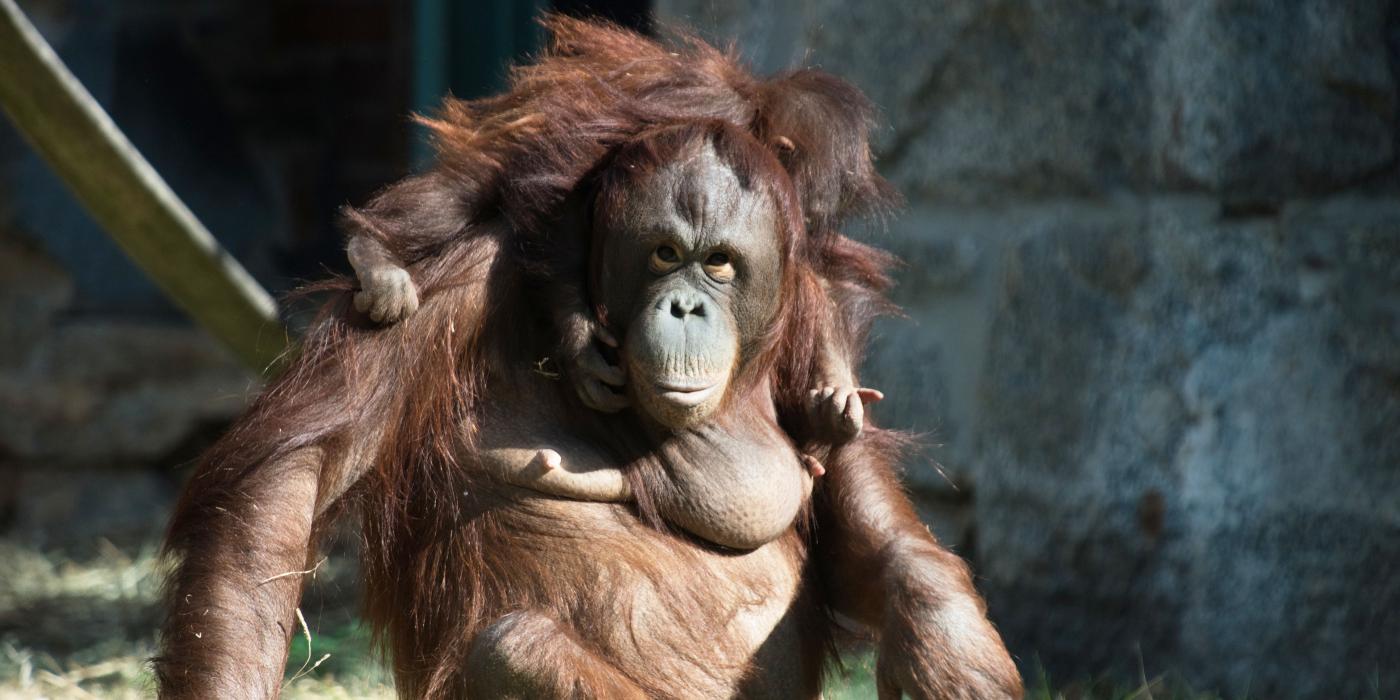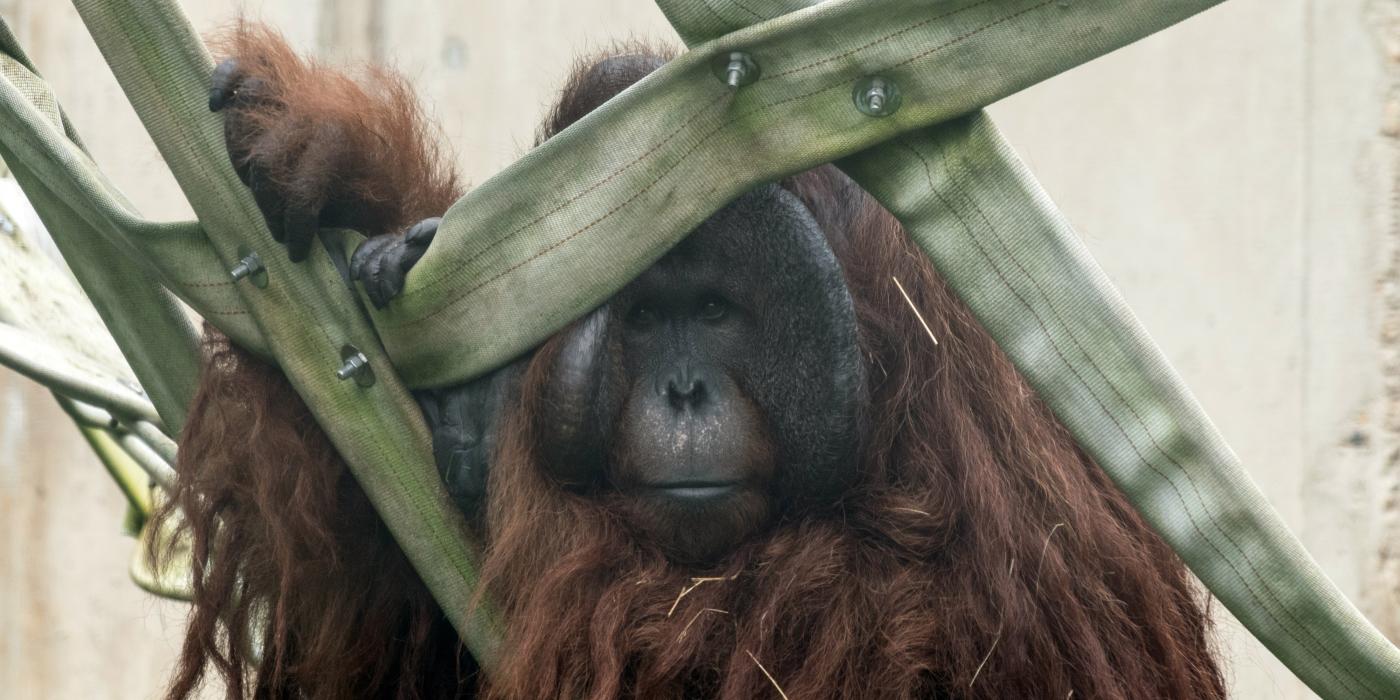What Are Orangutans Thinking?

Let’s play a game…for science! With a tap of the touch-screen computer, orangutans at the Smithsonian’s National Zoo try their memories at matching pictures. These games are more than just enrichment, says primate keeper Erin Stromberg. They also help scientists—like Dr. Michael Beran and Dr. Audrey Parrish—study the apes’ metacognition: do they know what they know?
Why study the way orangutans think?
Beran and Parrish: We share many cognitive processes in common with our closely-related primate species, including orangutans. The fun part of comparative cognition research is to try and develop tasks that allow us to tap into the minds of other animals.
Humans continuously monitor their thoughts, knowledge and cognitive processes. Our metacognition is sophisticated. We express this in our language, and we take for granted that other humans around us do the same thing.
Studies like this—which assess metacognition in orangutans and other species—give us a sense of where that sophistication comes from, and how we developed this capacity through evolution. We can better understand our own mental abilities by studying the ways in which orangutans and other primates use theirs.
How is metacognition useful for orangutans?
Stromberg: Orangutans make lots of decisions every day, both in the wild and in human care. They decide where to move to, what to eat, whom to interact with and how closely to watch the world around them. These decisions require perceiving the environment and remembering things about the world around them. Sometimes, decisions require reflection—thinking about what they may be seeing or remembering.
For example, orangutans have to try to remember where food is located. But, decision-making can also be more complicated. Is an approaching individual aggressive or friendly, or even a combination of these? The last time that individual approached, did things go well or not? If enough information is available, they can behave confidently.
But, if their memory is weak, or if they are uncertain that they know what they need to know, they may instead try to adjust their behavior to reduce this uncertainty. For example, they may choose to avoid the social interaction until they are certain the other orangutan is a friend or foe. That is the function of metacognition.
How do you determine if an orangutan is confident?
Beran and Parrish: An orangutan’s confidence can be reflected in movement. The Zoo’s orangutans play memory computer games as part of their daily enrichment program. They tap a picture on the screen and have to remember it during a 1-, 2-, 4-, 7- or 10-second delay in which the screen goes blank. Then, they choose the original picture from a set of four options—similar to a multiple-choice test. The test may be easier if the delay is short, or harder if the delay is long.
Once they try to match the picture they saw, they have a few seconds before the computer sounds an auditory tone, telling them if they are correct or incorrect. If correct, they are rewarded with one of their favorite foods—grapes—but the treat is delivered somewhere else in the test room.
If they wait to learn from the computer that they correctly matched the image, they have to hustle to the reward area to get their treat or risk missing the treat altogether (it rolls outside of the testing area, out of the orangutan’s reach). However, if they answer and know they are correct, they can go over to the treat area early, take their time, and get their reward. If they are not sure if they are correct, they can wait for the “correct” tone and then hustle. If incorrect, a different tone will sound, indicating they do not get a grape and should remain in front of the screen and play the next matching game.
Thus, the best response to this task would be for the orangutan to move to the grape site as soon as they answer the question—but only if they think they are correct. This requires meta-memory. Their movements tell us their level of confidence in how they did on the matching game.
Lucy is in the training phase of the metacognition study. She does not yet have to move to receive the reward.
Which of the Zoo’s orangutans participate in this study?
Stromberg: As with any of our enrichment and training programs, all of our orangutans have the opportunity to participate. Some studies—including this one—have a criterion level that the orangutans must meet on the on the Match-to-Sample memory game in order to be included in the study.
For this particular research, our 42-year-old female orangutan, Bonnie, and her 31-year-old son, Kiko, did not reach the criterion required to be included in this study. They still have access to the touchscreen computer game, but only for enrichment.
Our other orangutans—45-year-old female, Lucy, 31-year-old female, Iris, 22-year-old male, Kyle and 22-year-old female, Batang—passed the training phase and are included in the data collection phase of the study. They have been participating in this study since early 2018 and will continue until the data collection is complete.
Do the orangutans do this activity individually or with others?
Stromberg: We have been focusing on one orangutan at a time during the data collection phase of the study. They participate individually so that they have limited distractions and can act without being influenced by another orangutan. However, Kyle and Batang’s son, 2-year-old Redd, gets to hang with his mom while she plays the memory game. Sometimes, Batang will share her grapes with Redd, too!
Does personality influence their participation at all?
Stromberg: Patience varies between individuals. Iris and Lucy tend to diligently work until the entire task is over, which takes approximately 15 to 20 minutes. Batang has trouble sitting still and waiting for the pictures to appear on the screen and often fidgets until it does. Kyle is easily distracted by what the other orangutans may be doing, but he is a hard worker and does quite well on the task.
Related Species:


